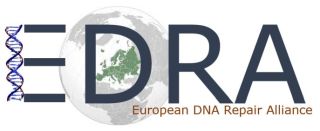|
|
|
Previous webinars > 11th Webinar 03/19/202411th EDRA WebinarMarch 19th, 2024, from 4 to 5:30 pm (CET)Keynote speaker : George Garinis, Institute of Molecular Biology & Biotechnology, Crete, Greece Title: DNA Damage and Innate Immune Signalling in Health and Disease Abstract: DNA damage and innate immune responses are intricately linked in mammals, working to safeguard our bodily functions over time. In the short term, this functional interplay would allow injured cells to restore damaged DNA templates or communicate their compromised state to the microenvironment. In the long term, however, it may result in the premature onset of age-related degeneration, including cancer. Here, we will discuss the beneficial and unrewarding outcomes of DNA damage-driven inflammation in the context of tissue-specific pathology and disease progression. Short talks : Pablo Alcón Hernández, MRC Laboratory of Molecular Biology, Cambridge, UK Title: Beyond recognition: molecular mechanism of FANCD2-FANCI in DNA repair Abstract: Fanconi Anemia (FA) is a hereditary syndrome caused by a defective ability to repair DNA inter-strand crosslinks (ICLs). This induces genome instability and leads to developmental defects and cancer predisposition. The products of at least 23 genes participate in a network for ICL repair, termed the FA pathway. A central step in the FA pathway is the monoubiquitination of FANCD2-FANCI (D2-I) by the FA core complex. Ubiquitinated D2-I (ubD2-I) is thought to serve as a molecular hub to recruit nucleases that will ‘unhook’ the lesion. We recently showed that D2-I is a DNA clamp locked onto DNA by the FA core complex. However, it is still unknown how the DNA damage site is detected, and how ubD2-I marks its location and recruits repair factors. I will present our recent and ongoing work combining electron cryo-microscopy (cryoEM) with biochemistry and other molecular biology techniques, to dissect the molecular basis for the activation and regulation of this essential DNA repair pathway.
Roman Chabanon, Institut Gustave Roussy, Villejuif, France Title: Targeting the DNA damage response in immuno-oncology: novel therapeutic opportunities Abstract: Immunotherapy has revolutionized cancer treatment and substantially improved patient outcome in multiple tumour types. However, most patients still do not benefit from such therapies, notably because of the absence of pre-existing T-cell infiltration. DNA damage response (DDR) deficiency has recently emerged as an important determinant of tumour immunogenicity. A growing body of evidence now supports the concept that DDR-targeted therapies can increase the antitumour immune response, essentially via three mechanisms: (i) promoting antigenicity through increased mutability and genomic instability; (ii) enhancing adjuvanticity through the stimulation of cytosolic nucleic acid sensing and interferon signalling; and (iii) favouring reactogenicity through the modulation of tumour cell surface immunoreceptors. In this talk, Roman Chabanon will share his recent research on the interplay between the DDR and anticancer immunity, highlighting the therapeutic opportunities presented by the activation of the cGAS/STING pathway in cancer cells, and focussing on innovative strategies investigated in early-phase clinical development.
|
| Online user: 4 | Privacy |

|

